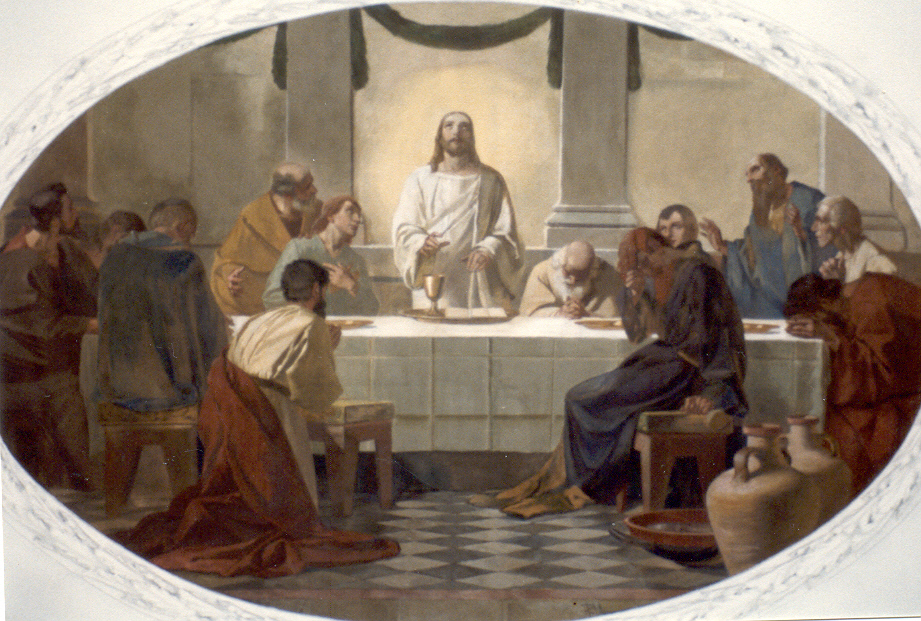
Return to
Index The Catholic Faith
Return to Level
Two Topic Index
Home Page
St. John's Gospel recorded the disbelief of many of Jesus' followers when he told them they would not have eternal life in them unless that ate his Body and drank his Blood. Their response was "This is a hard saying."
These were the words with which many of his followers greeted Jesus' announcement of the Holy Eucharist. If Jesus had been misunderstood he could have set things straight before they walked away from him. But Jesus did not stop them. In fact, the Gospel says: "Jesus was fully aware that his disciples were murmuring in protest at what he had said. 'Does it shake your faith?' he asked them" (Jn 6:61). The Gospel goes on to say: "From this time on, many of his disciples broke away and would not remain in his company any longer" (Jn 6:66).
What had Jesus said, exactly, which they would not accept? "He who feeds on my Flesh and drinks my Blood has life eternal, and I will raise him up on the last day. For my Flesh is real food and my Blood real drink (Jn 6:54-55). And what did those who did not believe say? "How can he give us his Flesh to eat?" (Jn 6:52)
We Have Come To Believe

The Gospel goes on to tell us: Jesus then said to the Twelve, "Do you want to leave me too?" Simon Peter answered him, "Lord, to whom shall we go? You have the words of eternal life; we have come to believe; we are convinced that you are God's holy one" (Jn 6:67-69). Jesus had not led his followers to this point to catch them unprepared. As Peter put it, they had "come to believe."
The apostles believed not because they understood, but because they had faith in Jesus. This is what Jesus was looking for. The Gospel says; "All this they said to him, 'What must we do to perform the works of God?' Jesus replied: 'This is the work of God: have faith in the One whom he sent.'" (Jn 6:28-29) Jesus had given them more than sufficient evidence to believe in him. He had been going about doing good, teaching and preaching the good news of the Kingdom of God, and performing many miracles.
In every generation Jesus looks for generous people who really hear him, who really want to be his followers and really put their faith in him, who will not turn away because of the "hard saying" about the Eucharist, who will say with St. Peter: "We have come to believe; we are convinced that you are God's holy one" (Jn 6:69).
My Flesh is Food Indeed
Just what was Christ offering the crowds when he announced the Eucharist? He said that his "Flesh is food indeed" and his "Blood is real drink." We have seen that he meant to be taken literally. However, he did not mean that the Eucharist would be food for our bodies. The Eucharist is spiritual food, nourishment for our souls.
What happens when we receive the Eucharist worthily? Because the Eucharist truly is the Body and Blood of Jesus, it is the source of all grace. It can transform us by the increase of sanctifying grace, which is God's life in the soul. We grow in holiness, which means that we become more like Jesus. Receiving the Eucharist can pardon our venial sins. Because it is such "rich and nourishing" food for our souls, it cancels out our lesser failings. It also strengthens us to overcome temptations and helps us to break bad habits.
Christ has a plan for extending his Kingdom to the whole world: he offers his followers the invitation to become other Christs. Those who feed on his Body and Blood have life in him - Christ's life, which does not destroy our personality, but perfects it and enriches it and preserves it to life everlasting.
"I am the Living Bread which came down from Heaven; if anyone eats of this Bread he will live forever" (John 6:50)
Used with the permission of The Ignatius Press 800-799-5534
Return to
Index The Catholic Faith
Return to Level
Two Topic Index
Top
Home Page